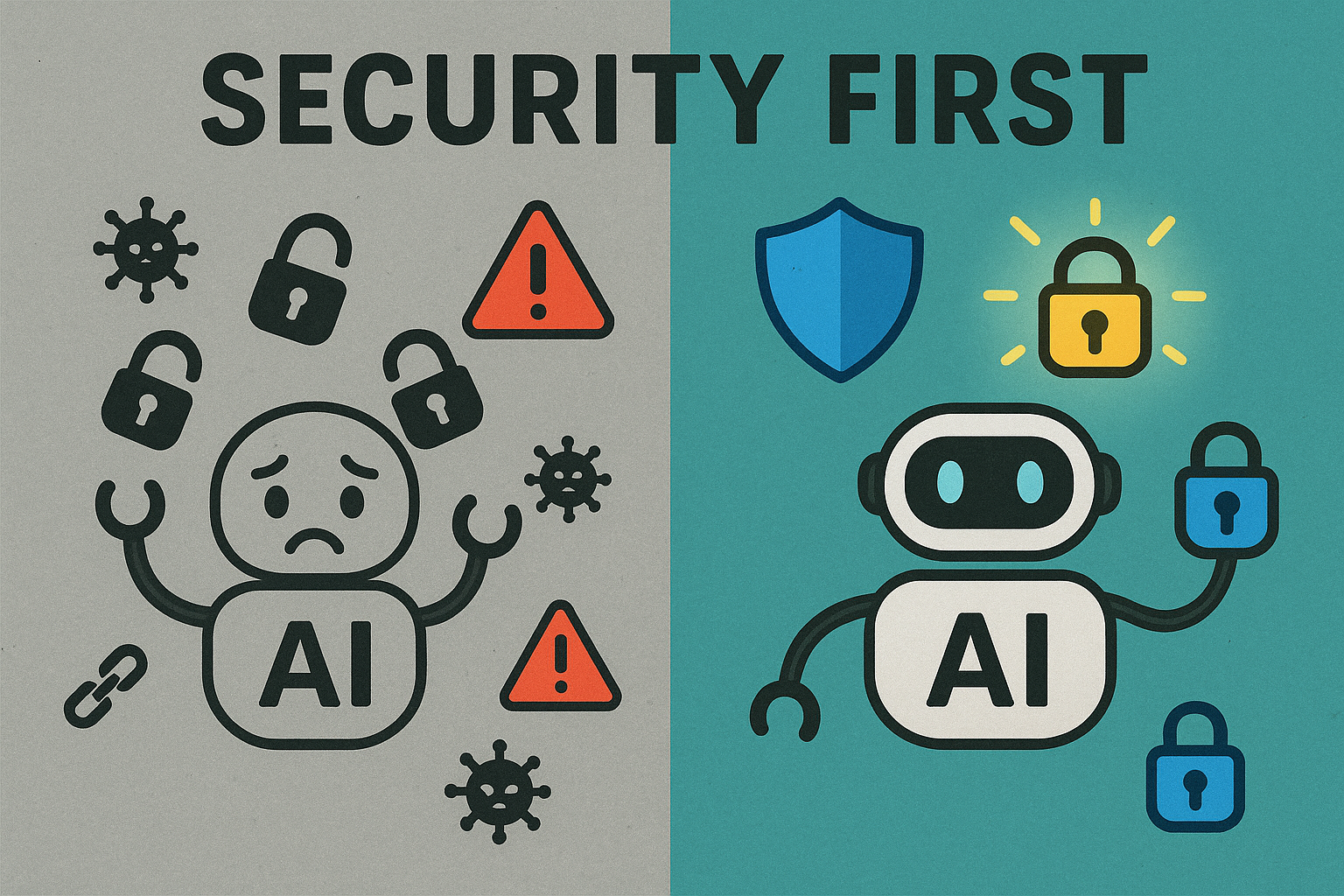Security First: How MCP Enables Safe Enterprise AI Integration
For Chief Information Security Officers and enterprise security teams, AI integration represents both tremendous opportunity and significant risk. While connected AI promises to transform business operations, it also creates new attack vectors, data exposure risks, and compliance challenges that traditional security frameworks weren't designed to address.

The fundamental question isn't whether to integrate AI with enterprise systems—competitive pressures make this inevitable. The question is how to do it safely, with proper governance, and in full compliance with regulatory requirements.
The Model Context Protocol (MCP) was designed with enterprise security as a foundational principle, providing the controls, visibility, and governance capabilities that CISOs require for safe AI deployment at scale.
The Enterprise AI Security Challenge
Traditional AI Security Gaps
Most AI implementations create security blind spots that concern enterprise security teams:
Uncontrolled Data Access
AI systems with broad permissions can access sensitive data they don't need for specific tasks, violating principle of least privilege
Limited Audit Trails
Generic AI platforms often provide insufficient logging of what data was accessed, by whom, and for what purpose
Inconsistent Access Controls
Each AI integration implements its own security model, creating management complexity and potential gaps
Data Residency Concerns
AI processing may occur in cloud environments without clear data location and sovereignty guarantees
Shadow AI Proliferation
Employees adopt unsanctioned AI tools, creating ungoverned data exposure risks
Compliance and Regulatory Pressure
Enterprise AI must navigate an increasingly complex regulatory landscape:
- GDPR and Data Privacy: AI systems must respect data subject rights, purpose limitations, and consent requirements
- SOX Compliance: Financial AI applications require proper controls and audit trails
- HIPAA Requirements: Healthcare AI must maintain strict patient data protection
- Industry Standards: Sector-specific regulations like PCI DSS, SOC 2, and FedRAMP impose additional constraints
- Emerging AI Regulations: New frameworks like the EU AI Act create specific AI governance requirements
Without proper security architecture, AI initiatives can create compliance violations that expose organizations to significant legal and financial risks.
MCP's Security-by-Design Architecture
Centralized Access Control and Authentication
MCP proxy gateways provide centralized security enforcement that addresses traditional AI security gaps:
Unified Authentication
All AI-to-system interactions flow through a single authentication point, enabling consistent identity management and multi-factor authentication enforcement
Role-Based Access Control (RBAC)
Granular permissions define exactly which users can access which systems through AI interfaces, with support for complex organizational hierarchies and temporary access grants
Dynamic Authorization
Access decisions can incorporate real-time context like user location, device trust level, time of day, and risk scoring to enforce adaptive security policies
Service Account Management
MCP servers operate with dedicated service accounts that have minimal required permissions, reducing attack surface and blast radius of potential compromises
Comprehensive Audit and Compliance Logging
MCP provides enterprise-grade audit capabilities that exceed traditional AI platforms:
- Complete Transaction Logging: Every AI interaction with enterprise systems is logged with full context, including user identity, requested actions, data accessed, and results returned
- Tamper-Evident Audit Trails: Cryptographically signed logs prevent unauthorized modification and provide legal-grade evidence for compliance reporting
- Real-Time Monitoring: Security operations centers can monitor AI activity in real-time, with alerts for unusual patterns, policy violations, or potential security incidents
- Compliance Reporting: Automated generation of audit reports for regulatory requirements, with customizable formats for different compliance frameworks
Data Governance and Privacy Protection
MCP enables sophisticated data governance controls that address privacy and regulatory requirements:
- Purpose-Based Access Control: AI systems can only access data appropriate for specific business purposes, with automatic enforcement of purpose limitations
- Data Minimization: MCP servers can filter and anonymize data before providing it to AI models, ensuring only necessary information is processed
- Consent Management: Integration with consent management platforms ensures AI processing respects individual privacy preferences and regulatory requirements
- Data Lineage Tracking: Complete visibility into how data flows from source systems through AI processing to final outputs, supporting data subject rights and impact assessments
Advanced Security Features
Zero-Trust Architecture Integration
MCP aligns with zero-trust security principles by default:
- Never Trust, Always Verify: Every AI request is authenticated and authorized, regardless of source or previous interactions
- Least Privilege Access: AI systems receive only the minimum permissions required for specific tasks, with automatic privilege escalation controls
- Continuous Verification: Ongoing assessment of user and system trust levels, with dynamic policy enforcement based on risk scores
- Microsegmentation: MCP servers can be deployed in isolated network segments with controlled communication paths, limiting lateral movement in case of compromise
Encryption and Data Protection
MCP implements comprehensive encryption and data protection measures:
- End-to-End Encryption: All communication between AI clients and MCP servers uses industry-standard encryption protocols (TLS 1.3+)
- Data-at-Rest Protection: MCP servers can integrate with enterprise key management systems and hardware security modules for sensitive data protection
- Secure Multi-Tenancy: MCP proxy gateways provide secure isolation between different user groups, departments, or business units sharing the same infrastructure
- Credential Management: Integration with enterprise secret management systems ensures secure storage and rotation of API keys, database credentials, and other sensitive authentication materials
Threat Detection and Response
MCP enables advanced security monitoring and threat response capabilities:
- Behavioral Analytics: Machine learning models analyze AI usage patterns to detect anomalous behavior that might indicate compromise or misuse
- Automated Threat Response: Integration with security orchestration platforms enables automatic response to detected threats, including access revocation and incident escalation
- Insider Threat Detection: Sophisticated analysis of user behavior patterns can identify potential insider threats or account compromise
- Attack Surface Monitoring: Continuous assessment of MCP deployment security posture, with alerts for configuration drift or potential vulnerabilities
Compliance Framework Alignment
GDPR and Privacy Regulation Compliance
MCP provides specific capabilities for privacy regulation compliance:
- Data Subject Rights: Automated processing of access, rectification, and deletion requests across all connected systems
- Privacy by Design: Built-in privacy controls that activate by default, rather than requiring manual configuration
- Cross-Border Transfer Controls: Geographic routing and data residency controls ensure compliance with data transfer restrictions
- Consent Enforcement: Real-time consent checking prevents AI processing when consent is withdrawn or expired
Financial Services Compliance
For organizations subject to financial regulations, MCP offers:
- SOX Controls: Comprehensive audit trails and access controls that support SOX compliance certification
- PCI DSS Alignment: Secure handling of payment data with appropriate tokenization and encryption controls
- Regulatory Reporting: Automated generation of regulatory reports with proper data governance and audit trail documentation
Healthcare and HIPAA Compliance
Healthcare organizations can leverage MCP's healthcare-specific security features:
- Patient Data Protection: Sophisticated access controls ensure AI systems only access patient data when clinically justified
- Audit Requirements: Comprehensive logging meets HIPAA audit trail requirements for patient data access
- Breach Response: Automated breach detection and notification capabilities support regulatory reporting requirements
Risk Management and Governance
AI Ethics and Governance Integration
MCP supports emerging AI governance requirements:
- Algorithmic Transparency: Logging and audit capabilities provide visibility into AI decision-making processes for regulatory compliance
- Bias Detection: Integration with AI fairness monitoring tools to detect and mitigate algorithmic bias in enterprise applications
- Model Governance: Version control and change management for AI models with proper approval workflows and rollback capabilities
Business Continuity and Disaster Recovery
MCP includes enterprise-grade resilience features:
- High Availability: Redundant deployments with automatic failover ensure AI capabilities remain available during system outages
- Disaster Recovery: Backup and recovery procedures for MCP configurations, audit logs, and system state
- Business Impact Analysis: Assessment tools help prioritize AI system recovery based on business criticality
Implementation Best Practices for Security Teams
Phased Security Deployment
Phase 1 - Foundation
Deploy MCP proxy gateway with basic authentication and audit logging
Phase 2 - Access Control
Implement role-based access control and data governance policies
Phase 3 - Advanced Security
Add behavioral analytics, threat detection, and automated response capabilities
Phase 4 - Compliance
Integrate with compliance monitoring and regulatory reporting systems
Security Architecture Considerations
- Network Segmentation: Deploy MCP components in appropriate network zones with proper firewall controls
- Identity Integration: Connect MCP to existing identity providers and privileged access management systems
- Monitoring Integration: Incorporate MCP audit logs into existing SIEM and security monitoring infrastructure
- Incident Response: Update incident response procedures to include AI-specific security scenarios
Ongoing Security Operations
- Regular Security Assessments: Periodic evaluation of MCP security posture and configuration review
- Threat Modeling: Continuous assessment of AI-specific threats and attack vectors
- Security Training: Education for development and operations teams on AI security best practices
- Compliance Monitoring: Ongoing verification that AI deployments maintain regulatory compliance
The Security Imperative for AI Success
Enterprise AI adoption is not optional—it's a competitive necessity. But AI deployments without proper security controls create unacceptable risks that can undermine business objectives and expose organizations to significant legal and financial consequences.
MCP provides the security foundation that enables enterprises to embrace AI innovation while maintaining the risk management and compliance posture that stakeholders expect. Organizations that prioritize security in their AI architecture will not only protect themselves from emerging threats but also accelerate AI adoption by addressing the fundamental concerns that often slow enterprise deployment.
For CISOs and security teams, MCP represents more than just another technology platform—it's the security architecture that makes enterprise AI both possible and safe.
